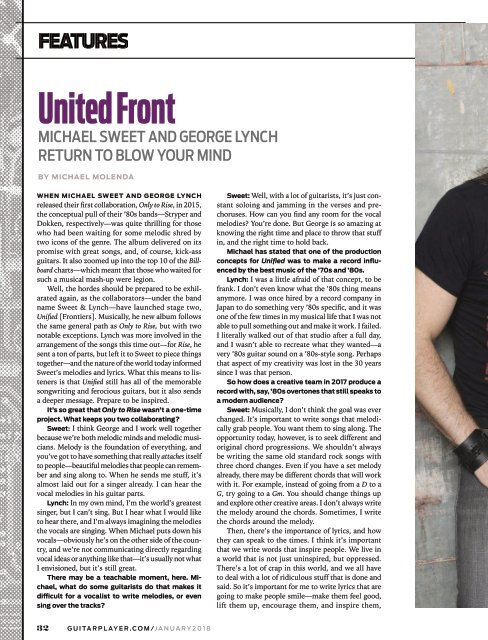Create successful ePaper yourself
Turn your PDF publications into a flip-book with our unique Google optimized e-Paper software.
FEATURES<br />
United Front<br />
MICHAEL SWEET AND GEORGE LYNCH<br />
RETURN TO BLOW YOUR MIND<br />
BY MICHAEL MOLENDA<br />
WHEN MICHAEL SWEET AND GEORGE LYNCH<br />
released their first collaboration, Only to Rise, in 2015,<br />
the conceptual pull of their ’80s bands—Stryper and<br />
Dokken, respectively—was quite thrilling for those<br />
who had been waiting for some melodic shred by<br />
two icons of the genre. The album delivered on its<br />
promise with great songs, and, of course, kick-ass<br />
guitars. It also zoomed up into the top 10 of the Billboard<br />
charts—which meant that those who waited for<br />
such a musical mash-up were legion.<br />
Well, the hordes should be prepared to be exhilarated<br />
again, as the collaborators—under the band<br />
name Sweet & Lynch—have launched stage two,<br />
Unified [Frontiers]. Musically, he new album follows<br />
the same general path as Only to Rise, but with two<br />
notable exceptions. Lynch was more involved in the<br />
arrangement of the songs this time out—for Rise, he<br />
sent a ton of parts, but left it to Sweet to piece things<br />
together—and the nature of the world today informed<br />
Sweet’s melodies and lyrics. What this means to listeners<br />
is that Unified still has all of the memorable<br />
songwriting and ferocious guitars, but it also sends<br />
a deeper message. Prepare to be inspired.<br />
It’s so great that Only to Rise wasn’t a one-time<br />
project. What keeps you two collaborating?<br />
Sweet: I think George and I work well together<br />
because we’re both melodic minds and melodic musicians.<br />
Melody is the foundation of everything, and<br />
you’ve got to have something that really attaches itself<br />
to people—beautiful melodies that people can remember<br />
and sing along to. When he sends me stuff, it’s<br />
almost laid out for a singer already. I can hear the<br />
vocal melodies in his guitar parts.<br />
Lynch: In my own mind, I’m the world’s greatest<br />
singer, but I can’t sing. But I hear what I would like<br />
to hear there, and I’m always imagining the melodies<br />
the vocals are singing. When Michael puts down his<br />
vocals—obviously he’s on the other side of the country,<br />
and we’re not communicating directly regarding<br />
vocal ideas or anything like that—it’s usually not what<br />
I envisioned, but it’s still great.<br />
There may be a teachable moment, here. Michael,<br />
what do some guitarists do that makes it<br />
difficult for a vocalist to write melodies, or even<br />
sing over the tracks?<br />
Sweet: Well, with a lot of guitarists, it’s just constant<br />
soloing and jamming in the verses and prechoruses.<br />
How can you find any room for the vocal<br />
melodies? You’re done. But George is so amazing at<br />
knowing the right time and place to throw that stuff<br />
in, and the right time to hold back.<br />
Michael has stated that one of the production<br />
concepts for Unified was to make a record influenced<br />
by the best music of the ’70s and ’80s.<br />
Lynch: I was a little afraid of that concept, to be<br />
frank. I don’t even know what the ’80s thing means<br />
anymore. I was once hired by a record company in<br />
Japan to do something very ’80s specific, and it was<br />
one of the few times in my musical life that I was not<br />
able to pull something out and make it work. I failed.<br />
I literally walked out of that studio after a full day,<br />
and I wasn’t able to recreate what they wanted—a<br />
very ’80s guitar sound on a ’80s-style song. Perhaps<br />
that aspect of my creativity was lost in the 30 years<br />
since I was that person.<br />
So how does a creative team in 2017 produce a<br />
record with, say, ’80s overtones that still speaks to<br />
a modern audience?<br />
Sweet: Musically, I don’t think the goal was ever<br />
changed. It’s important to write songs that melodically<br />
grab people. You want them to sing along. The<br />
opportunity today, however, is to seek different and<br />
original chord progressions. We shouldn’t always<br />
be writing the same old standard rock songs with<br />
three chord changes. Even if you have a set melody<br />
already, there may be different chords that will work<br />
with it. For example, instead of going from a D to a<br />
G, try going to a Gm. You should change things up<br />
and explore other creative areas. I don’t always write<br />
the melody around the chords. Sometimes, I write<br />
the chords around the melody.<br />
Then, there’s the importance of lyrics, and how<br />
they can speak to the times. I think it’s important<br />
that we write words that inspire people. We live in<br />
a world that is not just uninspired, but oppressed.<br />
There’s a lot of crap in this world, and we all have<br />
to deal with a lot of ridiculous stuff that is done and<br />
said. So it’s important for me to write lyrics that are<br />
going to make people smile—make them feel good,<br />
lift them up, encourage them, and inspire them,<br />
32 GUITARPLAYER.COM/JANUARY<strong>2018</strong>


